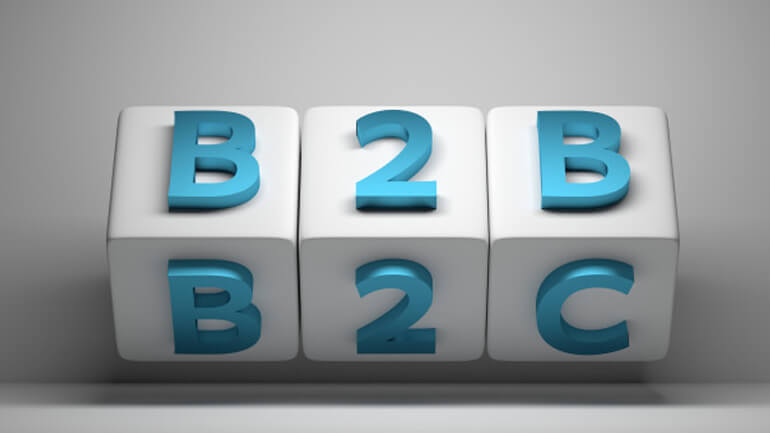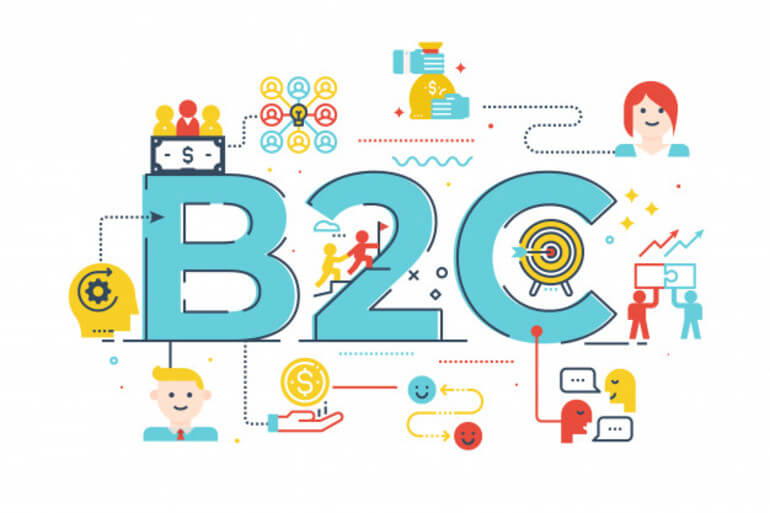
Whether you choose B2B and B2C, you will sell goods and services to a certain audience. Still, in our experience, the business experience between these two forms of marketing is so fundamentally different.
Therefore, it is vital for you to understand your target audience and choose the right business system for them. Of course, explaining the difference between B2B and B2C is not easy since these business models have a variety of it.
But nothing is impossible.
You will get an overview that is still deep enough about the topic through this article. We will provide you with five most recognizable factors to distinguish B2B and B2C, from cost, how to operate to their complexity.
Do not ignore it!
What is B2B?
Business-to-business, or B2B, can simply mean that your company sells products and services to distributors or raw products to other enterprises, not consumers.

B2B
Let’s take the automobile manufacturing market as a typical example of the B2B business in real life.
There are many famous car manufacturers in the world. And in fact, their car products and models contain many parts of other material manufacturers. They can be tires, batteries, electronic devices, paints, handles, or air filters, etc. These car companies need them to be able to combine and produce the final product to sell to customers, and they can import from many different sources.
In addition, B2B often happens when a business needs other people’s services to run a company. Data storage software or security services are good examples of this case.
Also, there is another case that any homemaker will feel familiar – supermarkets. These places will import final goods from big distributors to sell to consumers.
This indicates that all business activities will need B2B operations.
In the B2B model, products and their features will be more focused to meet the tastes of customers. That is, your products and services must play a role in saving their time, money, and resources. Therefore, if you decide to follow this type of marketing, build trust in your customers by understanding the positive effects of your products on them.
Pros
- As a wholesaler, you will only have to negotiate and make contracts with fewer people rather than many consumers as retailers do. Therefore, this job will be faster and easier.
- When you trade, the amount of goods sold to businesses is often larger than that sold to consumers. It also allows you to save a lot of costs of operating, warehousing, or shipping, etc.
- When you make a deal with many large companies, you will generate a considerable income at the same time.
Cons
- The market for B2B companies will be more limited as their target customers are other businesses.
- Negotiating and signing contracts also take a lot of time and there is a potential risk of loss due to fraud. In case your customers pay late, the amount of debt will be very large.
- When you sell a large number of products and services, you will often have to discount your customers.
How about B2C?
In contrast to B2B, business-to-consumer (B2C) is the process of selling and buying products and services directly between manufacturers or retailers and consumers.

B2C
Why is it called “directly”?
Because this process does not go through any intermediaries.
This concept is probably easier to understand than the B2B concept. Nonetheless, we still want to take some short examples to give you the best insight into this type of business.
When you decide to invest in a local movie theater, that means you will sell movie service, serve popcorn and coke to customers. That is called a B2C business.
This marketing idea has been widely popular since the internet’s development with the rise of online retailers, such as Amazon, eBay, and Priceline. They allow consumers to make purchases with just a few mouse clicks.
Because of this convenience, they have been more invested and become a threat to traditional retailers.
And unlike B2B, B2C businesses often focus on buyers’ emotions rather than their logic. This also explains why the reputation of these businesses is determined by the media and the public.
And here are the advantages and drawbacks of B2C marketing. Of which, you will notice that they are completely against the B2B that we’ve mentioned above.
Pros
- The market size of B2C businesses depends on the industry, but it is still very large, much broader than the market of B2B companies. That’s because their customers are not wholesalers, but those buy goods in a much more limited quantity.
- The bidding will also take place very quickly, without having to go through too many complicated terms. Additionally, buyers will also get the final goods rather than buying different parts from multiple suppliers.
- Shipping goods in small quantities will also be faster and more compact.
- Often, retailers will make a larger profit on one unit of goods compared to wholesalers.
- Risks will also be less than when operating on a B2B basis.
Cons
- Of course, when you sell goods and services to consumers, the time it takes for you to clear all of your inventory and get revenues will take longer than wholesale.
- Because goods storing time of B2C is longer than B2B business, warehousing and transportation costs will also be greater.
- You will have to spend quite a lot of money on advertising products and businesses.
5 differences between B2B and B2C
Customer relationship
When running a B2B business, building a long-term personal relationship with your customers will allow you to continue on future contracts. This is essential because the volume of goods is large, while the B2B market is niche. And when you promote long-term business relationships with customers, you also won’t have to worry about the competition of your rivals.
As for B2C, you will not build a personal relationship with consumers but the transactional relationship, instead. This will encourage consumers to buy more of your products.
Branding
You should know the difference between branding between these two types of businesses. That’s because branding can make a company shine and stand out in the market, improve market share, and achieve customer loyalty.
Because B2B companies need to build trust in potential customers, they will build their brand by focusing on relationships. B2C businesses, meanwhile, will convey the message to their customers through promotional campaigns, advertisements, or word-of-mouth. As a result, customers will remember their brands and search for their products when needed among many other names.
Decision-making process
The B2B decision-making process is where you can create an emotional connection between you and your customers to boost their financial minds that this is a good investment. This process needs to be open for both sides to review and evaluate.
Meanwhile, as a B2C marketer, you will need to understand customer tastes and continue to attract them to buy your products. At this point, every process will succeed when simplified. That is, the more understandable and attractive the sales and payment process, the faster you will sell.
That’s why the B2B decision-making process usually takes more time and involves more people than B2C.
Customer targeting
B2B businesses operate in niche markets, so it’s significant to understand the market. Your targeted customers will not be too abundant, so you’ll need data analyzed and focused accurately, with some tactics like Google Analytics demographic data analysis.
As for B2C, finding potential customers will be much easier through funnel marketing. You can push ads to find potential customers, which are larger than the B2B. Then, remarketing to them to drive sales.
Payment and pricing
For B2B, you may have to offer preferential rates to customers because they buy in bulk. And the payment mechanism will also be more complex and different between various customers.
As for B2C transactions, prices will depend entirely on the seller except for some special cases, such as low demand while the supply is too large, or the level of competition is high. Transactions will also take place more quickly.
Our last words
Do you understand the difference between B2B and B2C now? Let us recap it for you.
While a B2B transaction usually involves more people and creates a more significant revenue stream, B2C business purchases are less complex but less revenue due to the difference in the number of goods. Moreover, B2B and B2C differ in the business’s relationship with customers as well as the strategies needed to build the brand identity. And, the operating costs for a B2B business will also be greater.
Through a deeper knowledge of these forms of marketing, hope you can choose the right direction for your business. You can also leverage resources to combine the two when your company is eligible for growth.
If you have any further questions, feel free to contact us and see what we can do for you. Don’t forget to like and share the article with others if it’s useful for you.